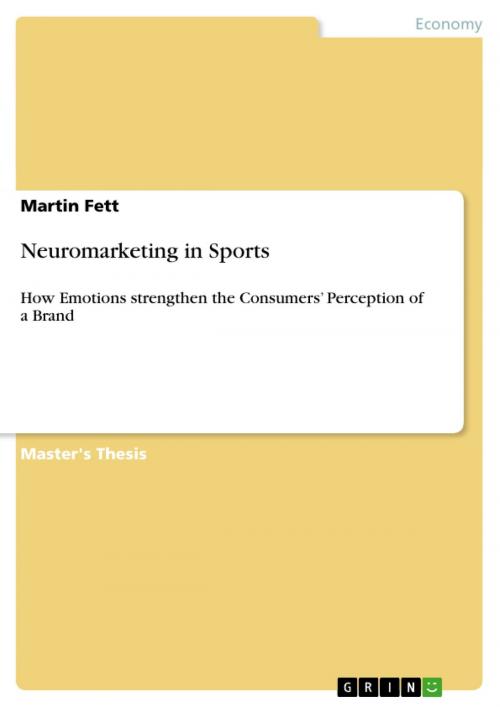Neuromarketing in Sports
How Emotions strengthen the Consumers' Perception of a Brand
Business & Finance, Marketing & Sales| Author: | Martin Fett | ISBN: | 9783656201403 |
| Publisher: | GRIN Publishing | Publication: | May 29, 2012 |
| Imprint: | GRIN Publishing | Language: | English |
| Author: | Martin Fett |
| ISBN: | 9783656201403 |
| Publisher: | GRIN Publishing |
| Publication: | May 29, 2012 |
| Imprint: | GRIN Publishing |
| Language: | English |
Master's Thesis from the year 2011 in the subject Business economics - Marketing, Corporate Communication, CRM, Market Research, Social Media, grade: 1,0, University of Lugano, course: Sponsorship and Partnership Management - Corporate Communication, language: English, abstract: Until now, economic theory has not systematically integrated the impact of emotions on brand perception. Evidence from the evolving discipline of neuroscience suggests that decision-making is dependent on emotional processing. Interdisciplinary research under the label of 'neuromarketing' arose. The key idea of this approach is to employ recent neuroscientific methods in order to analyze economically relevant brain processes. This thesis offers an overview of the current state of neuroeconomic research by defining the concept of neuromarketing, explaining methods that are widely used and describing current studies in this new research area. The study which was conducted within this master thesis finally provides guidance for future research. Several studies found that there are no separated ways for cognition and emotion in a human being's brain. Emotions are deeply connected with cognitive processing and thus, even are a crucial part of human decision making. Since more and more companies want to enhance their brands, products, and services with emotions, they are trying to use this important precondition and are engaging in sports sponsorships, because sports as such is considered the biggest and most emotional power in entertainment business. Several authors claim that in addition there has rarely been coherent research for sponsorship in general - and if at all, then only regarding the awareness of the sponsoring brands. Also, companies are not really aware if they seize the high potential of their sponsorship activities. About 21% of companies that apply sponsorship strategies into practice do not even conduct a controlling phase. They are not measuring the achievement of their sponsorship objectives. Hence, they do not even know the success (or failure) of their strategies. Does sponsorship in sports have significant effects at all? Does it help to increase a brand's image? Only explicit measuring is very common in controlling the effects of sponsorship activities. The probands are being asked whether they remember one brand or another and how they rate it. Too often, however, the results are biased by many wrong preconditions, for example the Social Desirability Bias or that the sponsors only want to hear what they want to hear.[...]
Master's Thesis from the year 2011 in the subject Business economics - Marketing, Corporate Communication, CRM, Market Research, Social Media, grade: 1,0, University of Lugano, course: Sponsorship and Partnership Management - Corporate Communication, language: English, abstract: Until now, economic theory has not systematically integrated the impact of emotions on brand perception. Evidence from the evolving discipline of neuroscience suggests that decision-making is dependent on emotional processing. Interdisciplinary research under the label of 'neuromarketing' arose. The key idea of this approach is to employ recent neuroscientific methods in order to analyze economically relevant brain processes. This thesis offers an overview of the current state of neuroeconomic research by defining the concept of neuromarketing, explaining methods that are widely used and describing current studies in this new research area. The study which was conducted within this master thesis finally provides guidance for future research. Several studies found that there are no separated ways for cognition and emotion in a human being's brain. Emotions are deeply connected with cognitive processing and thus, even are a crucial part of human decision making. Since more and more companies want to enhance their brands, products, and services with emotions, they are trying to use this important precondition and are engaging in sports sponsorships, because sports as such is considered the biggest and most emotional power in entertainment business. Several authors claim that in addition there has rarely been coherent research for sponsorship in general - and if at all, then only regarding the awareness of the sponsoring brands. Also, companies are not really aware if they seize the high potential of their sponsorship activities. About 21% of companies that apply sponsorship strategies into practice do not even conduct a controlling phase. They are not measuring the achievement of their sponsorship objectives. Hence, they do not even know the success (or failure) of their strategies. Does sponsorship in sports have significant effects at all? Does it help to increase a brand's image? Only explicit measuring is very common in controlling the effects of sponsorship activities. The probands are being asked whether they remember one brand or another and how they rate it. Too often, however, the results are biased by many wrong preconditions, for example the Social Desirability Bias or that the sponsors only want to hear what they want to hear.[...]















